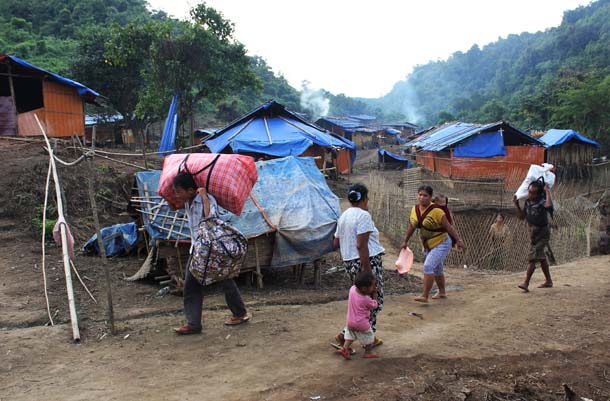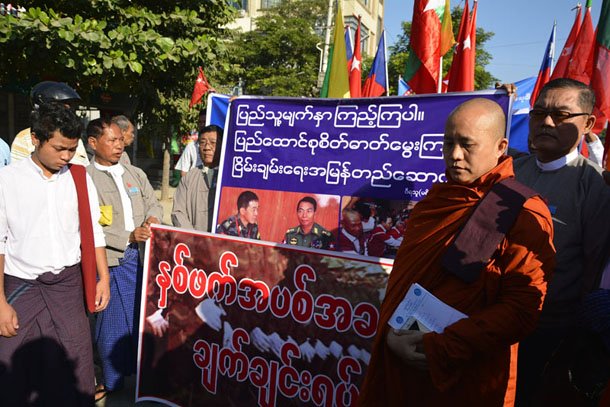Posts Tagged ‘Civil Society Organizations’ (42 found)
Time for a Paris-Principles Compliant National Human Rights Commission in Myanmar
The Asian NGO Network on National Human Rights Institutions (ANNI), together with its member, Burma Partnership (BP) deplores recent actions taken by the Myanmar National Human Rights Commission (MNHRC) in urging the victims in a high-profile child torture case to pursue financial settlement instead of proper legal action. ANNI and BP also wish to reiterate the need to further strengthen the Commission in order to fully comply with the Paris Principles […]
• • •“From Genuine Peace Negotiation, Toward Federal Union”
We, the Women’s League of Burma (WLB), on the occasion of the International Day of Peace on September 21st, send our wishes to the ethnic people of Burma to be healthy and happy […]
• • •Border-based CSOs call for elimination of blacklist
Civil society organisations (CSOs) operating on Burma’s borders are calling on State Counsellor Aung San Suu Kyi to eliminate a blacklist that continues to prevent them from fully participating in the country’s democratic transition, according to a statement released on Tuesday […]
• • •Statement of Civil Society Organizations on the Current Severe Flooding in Myanmar
Eleven States and Regions of Myanmar are encountering inundation and deluges with millions of people facing flooding distress. The floods, that began two weeks ago, have affected hundreds of thousands of people in Sagaing, Bago and Ayeyarwaddy Divisions as well as in Kachin, Chin and Arakan States, and these areas are urgently in need of emergency relief and aid. Dozens of people have perished in the floods and more than eight hundred thousand acres of farmland are submerged, according to numerous reports […]
• • •Statement from the Open Government Partnership Awareness Workshop for Civil Society
Over 193 representatives from 80 Civil Society Organizations (CSOs) and networks in Myanmar participated in the Open Government Partnership (OGP) awareness-raising workshop in Yangon from 19-20 January 2015. The objective of this workshop was to raise awareness and understand the potential benefits, opportunities, weaknesses and concerns regarding Myanmar’s participation in the OGP in the context of the recent transition process and the political developments in Myanmar since 2011 […]
• • •Statement of the Special Rapporteur on the Situation of Human Rights in Myanmar
Today is the final day of my second official visit to Myanmar as Special Rapporteur on the situation of human rights in Myanmar. It has been a visit rich in its diversity, geography, viewpoints and experiences. I have engaged with government officials, parliamentarians, religious and community leaders, civil society representatives, victims of human rights violations and members of the international community. My discussions have been frank, open, sometimes passionate but always welcoming. I am feeling more and more a part of this country and am privileged to be accompanying the people of Myanmar on this journey of reform towards greater enjoyment of human rights. My visit would not have been possible without the genuine cooperation of the Government of Myanmar and the committed support of the United Nations Country Team. I wish to express my sincere appreciation to both organisations […]
• • •Assistant Secretary of State Malinowski’s Travel to Burma
Assistant Secretary of State for Democracy, Human Rights and Labor Tom Malinowski and U.S. Ambassador Derek Mitchell will lead a delegation of senior U.S. officials from the Departments of State, Defense, and USAID to the second U.S.-Burma Human Rights Dialogue January 11-17, 2015 […]
• • •How Many More Lives? Burma Army Must Immediately Halt its Offensives in Kachin State
 Despite repeated calls from the international community, governments and civil society for an immediate halt to hostilities in Kachin and northern Shan State, on 19 November, 2014 the Burma Army fired several artillery missiles as “warning shots” onto the Kachin Independent Army’s (KIA) training academy in Laiza, Kachin State, killing 23 cadets and seriously injuring 20 others. Laiza is not only the KIA’s strong-hold. It is a city with over 20,000 civilians and a host to over 17,000 internally displaced persons (IDPs).
Despite repeated calls from the international community, governments and civil society for an immediate halt to hostilities in Kachin and northern Shan State, on 19 November, 2014 the Burma Army fired several artillery missiles as “warning shots” onto the Kachin Independent Army’s (KIA) training academy in Laiza, Kachin State, killing 23 cadets and seriously injuring 20 others. Laiza is not only the KIA’s strong-hold. It is a city with over 20,000 civilians and a host to over 17,000 internally displaced persons (IDPs).
Just days after the killing in Laiza, the Burma Army began firing shells near IDP camps. Some of the shells landed near a boarding school housing about 1,000 IDP children. These subsequent attacks near the camps threatened the lives of over 10,000 IDPs and raised much anxiety among the most vulnerable communities who have continuously fled the conflict. Fortunately, no one was hurt in these attacks, but many of the IDPs were forced to flee again in terror to the nearby jungle.
The narrative of “reform” and the sweeping political changes that have been praised and funded by the international community is quickly coming apart at the seams. While the Burma Government continues to use its rhetoric of change and democracy to encourage international governments, donors and investors to continue funding the peace process and development projects, they made one of the most deadly targeted attacks in Kachin State since the ceasefire broke down in 2011. This attack raised serious doubts among the ethnic groups who have threatened to abandon talks aimed at achieving a nationwide ceasefire accord. These talks, ongoing for nearly two years, have proved to be thus far redundant, as the Burma Army obviously has no other goal than the elimination of all ethnic armed groups without committing to any genuine, structural reforms. […]
• • •ႏုိင္ငံေတာ္သမၼတ ဦးသိန္းစိန္ထံသုိ႔ အိတ္ဖြင့္ေပးစာ- Open Letter to President Thein Sein
စီးပြားေရးဖြံ႕ၿဖိဳးတုိးတက္ၿပီး ျမန္မာႏုိင္ငံသား အားလံုးအတြက္ အဆင့္အတန္းျမင့္မားေသာ က်န္းမာေရး၊ ပညာေရးႏွင့္ ေကာင္း မြန္ေသာ အနာဂတ္မ်ားရရွိႏုိင္ရန္ ျပည္တြင္းၿငိမ္းခ်မ္းေရးသည္ မျဖစ္မေနလုိအပ္ခ်က္ တစ္ခုျဖစ္ေၾကာင္း ႏုိင္ငံေတာ္ သမၼတ ကုိယ္တုိင္ အခမ္းအနားမ်ားစြာတြင္ ထုတ္ေဖာ္ေျပာၾကား ခဲ့ဖူးပါသည္။ […]
• • •Mandalay Protestors Call for End to Ethnic Conflict
 MANDALAY — Political parties in Mandalay called on the government on Wednesday to end its armed conflicts in Burma’s ethnic regions and put more of an effort into the country’s peace process.
MANDALAY — Political parties in Mandalay called on the government on Wednesday to end its armed conflicts in Burma’s ethnic regions and put more of an effort into the country’s peace process.
At a demonstration led by nine political parties including the National Democratic Force (NDF), National Unity Party (NUP) and local civil society groups, protestors spoke out against a recent Burma Army attack in Kachin State that killed 23 ethnic rebel cadets and injured 20 others, saying the incident indicated a lack of resolve in the government’s purported desire to reach a sustainable peace with Burma’s numerous ethnic rebel groups. […]
• •








 All posts
All posts